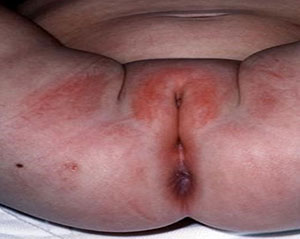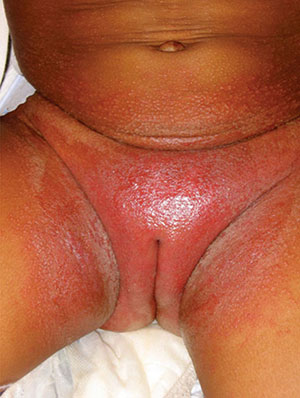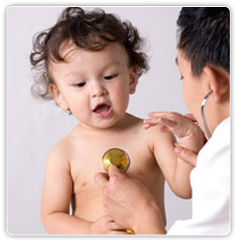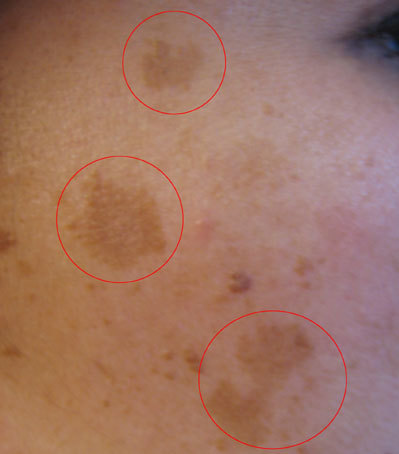Diaper dermatitis occurs due to prolonged contact with skin and face and many cases get infected secondarily with bacteria and candida albicans. These dermatitis conditions are somehow in one or the other way related to diapers that the baby wears and there are three main types of diaper dermatitis i.e. chafing dermatitis, irritant contact dermatitis and candida diaper dermatitis.

- Chafing dermatitis: It is generally seen in areas which are more prone to friction and where regular skin contact occurs like inner surface of thighs, genitalia and buttocks. It manifests in the form of eruptions and mild scaling which waxes and wanes quickly. Frequent changing of diaper and good hygiene yields good response and relief and no such medication is required.
- Irritant contact diaper dermatitis: it mainly involves the convex surfaces of the perineal area, the buttocks, the vulva, the perineal area, the lower abdomen and the proximal thighs with the intertriginous creases being spared. The cause of this disorder can be traced to the contact with proteolytic enzymes present in stool and different kinds of chemical irritants such as soaps, detergents, disinfectants and other topical preparations. The constant use of diaper can also lead to excessive heat, moisture and sweat retention locally.
- Candida diaper dermatitis:It is characterized by raised edge and sharp margin with white scales on the border and pinpoint pustulovesicular satellite lesions which are also the diagnostic hallmark. It is a beefy red erythema and is widespread on lower abdomen, buttocks and inner aspects of thighs. Candida albicans is found in the feces, thus lower intestine acts as a primary source of candida diaper dermatitis.
- Seborrheic dermatitis: The hallmark of seborrheic dermatitis of the diaperarea is the characteristic presence of salmon -colored, greasy plaques with yellowish scales and having a predilectionfor intertriginous area. Simultaneous involvement of the scalp, face, neck, post auricular and flexural areas helps aids in diagnosis.
- Erythema toxicum neonatorum: Erythema toxicum neonatorum (ETN), is an idiopathic, asymptomatic, benign,self- limiting, cutaneous eruption in full term newborns, found usually on trunk and proximal extremes, avoiding the soles and palm area. The rashes are self-emitting and most of them phase out in 6-12 days. No treatment is necessary for this as the lesions regress in 6 to 12 days.
- Ringworm : Ringworm skin disease has nothing to do with worms. The causative agent of ringworm is a common fungus that infects the skin and causes a scaly and elevated red patch that forms on the infected area. It is highly contagious, and ringworm can spread by contact or by sharing clothes in contact with the infected area. Generally, applying an antifungal cream to the affected area for a prolonged period until the infection subsides is the treatment of choice.
- Fifth disease: Fifth disease is caused by Parvovirus B19. It is quite common illness that is usually mild and resolves without any treatment. It typically begins with flu like symptoms. A “slapped cheek appearance” that is presence of a bright red rash on the cheeks is the defining feature and a rash on the body follow. Since fifth disease is caused by a virus, prescribing antibiotics play no role in the treatment. Parvovirus B19 can be dangerous to pregnant females, therefore it’s important to visit a health-care professional in the case of exposure.
- Sixth disease or Roseola: Roseola is a mild illness of viral etiology. The infection commonly occurs in infants and presents with a very high fever, which follows a non-itchy rash with a lacy pattern. The fever lasts for a couple of days and then resolves; however, it is significant to note that typically, the fever and rash do not occur at the same time. The rash appears on the torso or trunk first and then spreads to the rest of the body surface. Occasionally, such high-grade fever can trigger an episode of seizure in children, but this occurs less commonly.
Consult our doctor for treatment.
Homeopathy clinic near me
PCOD treatment barrackpore kolkata
Infertility clinic in Barrackpore kolkata
Best Hair Transplantation clinic in barrackpore kolkata
Hair transplantation in barrackpore kolkata
Hair loss treatment in barrackpore kolkata
Hair removal treatment near barrackpore kolkata
Hair treatment centre near me
Hair fall treatment in Kolkata
Best Skin Clinic in barrackpore kolkata
Acne Treatment in barrackpore kolkata
Anti Ageing Treatment in barrackpore kolkata
carbon laser peel treatment in barrackpore kolkata
Laser hair reduction treatment near barrackpore kolkata
Laser treatment in barrackpore kolkata





